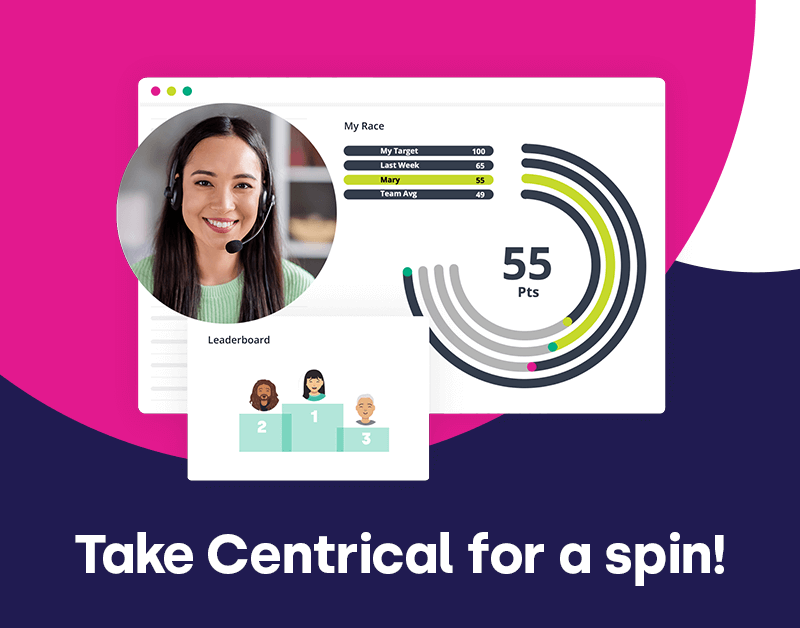When we speak of the frontline employee experience, it is usually in the context of the agent. But what about the manager? Given the impact the manager experience has on agent and customer experience, how can organizations prepare frontline managers to lead a modern workforce with rising expectations?
Ian Chappell, Centrical Director of Consulting, recently hosted our webcast, Demo Day: Supercharging the Frontline Manager Experience. In this follow-up interview, Ian spoke to Andrea Meyer about how frontline management has changed, how managers can harness the power of collaboration, and how organizations can set managers up for success.
Andrea Meyer: We often speak of the employee experience, but this is usually in the context of agents, and not managers.
Ian Chappell: I think it’s endemic in our industry that we tend to focus on the frontline colleagues only, but we forget that the experience received from a manager can massively impact the overall experience of a frontline employee. The simple answer is that it’s easy to set targets and benchmarks for frontline colleagues purely because of the amount of data available!
For 30 years we’ve recruited or backfilled manager positions from the frontline teams, yet we repeat the same mistakes time and again when it comes to preparing them for success.
AM: How has frontline management changed over the past few years, particularly in the arena of managing hybrid and remote employees?
IC: As mentioned, the way we recruit and prepare our frontline managers hasn’t changed a great deal. However, the role itself has changed massively. The pandemic was arguably the biggest change to how frontline colleagues are managed due to the ‘disconnectedness’ the hybrid working model created. We now see frontline employees joining the industry who have never actually stepped foot in a contact centre or office, meaning that collaboration between employee and manager is lacking!
AM: We see a lot of focus on onboarding for agents, but rarely ever for managers. What should a reboarding experience for a newly-promoted manager look like, and what kind of programs should be in place?
IC: It differs from vertical to vertical but generally we must remember that these managers are starting from ‘scratch’ again. They’ve reached the pinnacle of being a frontline colleague in terms of knowledge and competence yet they’re back to square one when they start as a frontline manager. Any onboarding needs a solid structure, with a development glide path and regular support and check-ins.
In a lot of cases there’s nothing formal in place and somehow expect new managers to develop a different skill set overnight. Instead, we see managers almost becoming administrators or seen as a resource to do non-management work. Organisations need to realise that 80% of a manager’s time should be spent collaborating and developing their people. They aren’t there as a ‘sticking plaster’ or a floating resource to help out elsewhere!
AM: How can organizations better support and prepare their managers for leading modern frontline employees and meeting rising customer expectations?
IC: Organisations must give managers the ability to manage to individuals’ strengths and weaknesses. As mentioned above, the more time a manager can spend with their team the better the relationship will become. A one-size-fits-all approach to any process in contact centre isn’t fit for purpose in 2023 – nor will it be in 2024.
Employees expect to bring their personalities and ideas to their roles and in their interactions with customers. Managers need the insight and time to tap into this, to get the best out of their teams. When I mention ‘time’ this is a key part of the experience for both employees and customers. All too often we see managers not having the time to influence their teams, which can impact the service their customer receives.

In case you missed it, watch the webcast now on demand.
AM: Let’s talk about the complexity vs support conundrum. Could you tell us a little about this, and how it can impact the manager and agent experience?
IC: We’ve seen a lot of automation of customer contacts across different channels over the past few years. The result is that by the time a customer reaches a frontline employee, they have something complex they need to discuss. This is always evolving along with the expectations of the customer. The longer the manager is away from day-to-day customer interaction, the less they understand this.
Because of this, we need to ensure that managers have the time to coach their employees on the right behaviours to better interact with customers. We’re moving away from the need to be experts on product and process, and more towards understanding customer needs. And we support those conversations. A manager needs a ‘set of tools’ to positively impact their employees’ service given to customers, again moving away from a ‘one size fits all’ approach.
Add into the mix that the complexity of queries is becoming more in-depth and nuanced; we have a perfect storm of frontline colleagues not feeling supported.
AM: During the webcast, you spoke about harnessing the power of collaboration. Can you tell us more about the importance of collaboration when it comes to the frontline?
IC: A manager’s success is determined by those they are responsible for. If we can move away from top-down management and move towards a more collaborative approach to improving the employee experience, this will enhance the customer experience. Collaboration can be achieved by a joint focus on individual success, which will impact the overall success of the team or organisation. We can kickstart this by ensuring our managers have time and actionable insight.
Also, we need to reassess how we define success and excellence, as this means something different to each employee. Someone who is a ‘top performer’ will have a different set of motivations and expectations to be successful than a new starter or someone onboarding new skills.
AM: What is your advice for organizations regarding enhancing the manager experience?
IC: Here are some ideas that organisations could implement to enhance the manager experience:
- Shared ownership of success between frontline employees and managers
- Remove non-value-add time from a manager’s day. Remember that managers have probably more stakeholders and touchpoints than other roles in a contact centre. We want them to be spending around 80% of their time developing their people but they also interact with Workforce Management, HR, Payroll, Training, and L&D (Learning and Development) to name a few. If they then have to do a lot of manual reporting/admin tasks this reduces the value-add time.
- Have a well-thought-out manager onboarding and development framework that includes elements such as calibration, knowledge sharing, buddy systems, wellbeing training, workflow streamlining, and company policies and procedures training.
It is also important to foster a culture of continuous learning with:
- Regular Updates: Keep managers informed about industry trends and advancements.
- Feedback Mechanisms: Establish a feedback loop for ongoing improvement and learning.
- Professional Development Opportunities: Provide resources for further education and skill enhancement.
Thank you once again to Ian for sharing his time and expertise! If you missed the webcast, Supercharging the Frontline Manager Experience is now available on demand. We also invite you to follow us on LinkedIn for webcast invitations and other event updates, industry thought leadership, Central news, and much more.
Are you ready to start transforming the manager experience at your organization? Watch the Centrical platform in action with a quick preview, and request your personalised demo today!
Engage and motivate your frontline teams
Improve performance with an AI-powered digital coach
Deliver world class CX with dynamic, actionable quality evaluations
Boost performance with personalized, actionable goals
Nurture employee success with the power of AI
Listen and respond to your frontline, continuously
Drive productivity with performance-driven learning that sticks
Drive agent efficiency, deliver client results
Keep tech teams motivated and proficient on products and services while exceeding targets
Maintain compliance while building customer happiness and loyalty
Enlighten energy teams to boost engagement
Engage, develop, and retain your agents while driving better CX
Improve the employee experience for your reservations and service desk agents








 Madeleine Freind
Madeleine Freind
 Natalie Roth
Natalie Roth Linat Mart
Linat Mart












 Doron Neumann
Doron Neumann Gal Rimon
Gal Rimon Daphne Saragosti
Daphne Saragosti Ella Davidson
Ella Davidson Ariel Herman
Ariel Herman Ronen Botzer
Ronen Botzer